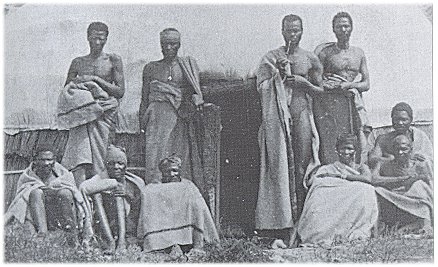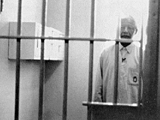A legendary Xhosa prophet, named Makana, was a strong warrior who led many attacks by the Xhosa army in retaliation at the Frontier Wars of 1818-19. This great warrior however did not have the power to beat the British and found himself surrendering to the British in an attempt that peaceful negotiation could be sought after. In 1820 he and 30 others attempted to escape from the island but did not survive.
|
 These chiefs spent their sentences in little huts at Murrays Bay on Robben Island. They were eventually moved to houses in 1863. |
|
As time continued, the Island became more of a hospital
and in the mid 1800's was populated by mentally ill, Lepers, diseased
and impoverished people. They were living under the same harsh conditions of
the prisoners and received no treatment for their illnesses.
They were chained and beaten and subjected to internal violence such as rape
and vicious attacks. They complained that the island was a damp, cold and lonely place where
their only joy came from smoking tobacco. The patients were expected to care for each other . In the 1800's homeless, prostitutes with sexually transmitted diseases, alcoholics and even people who were too old or sick to work, were classified as lunatics. In the beginning the sick lived together sharing various shelters with the prisoners. Toward the middle of the century the "lunatics" were separated from the rest of the island population. The black patients were then segregated and placed in a "Kraal" (an old sheep facility), and the white "lunatics" in a building called the asylum. Leprosy is a disease that affects the nerves and begins to manifest itself with the body deforming. Losing body appendices was common. A cure was not developed until the mid 1900's, and very little was known about this horrid disease. Ignorance bred fear and in 1890 the victims were banished to the island. They were separated from family and life as they knew it. Men and women were kept apart and lived in "pondoks" - old chicken sheds. In 1892 the lepers organised a protest against the harsh conditions the British placed on them. Franz Jacobs led the rebellion and wrote to the Queen. Further troops were sent to end the contest, and succeeded when Jacobs was forced to admit that he was wrong to have rebelled. Things apparently got better within the next few years for the lepers. They were allowed visitors, post, and eventually the buildings where they resided were renovated and repaired. |
 The British also decided to use Robben Island
for the unruly and unsuitable. Where they sent criminals of varying penalties,
army deserters, murderers, thieves
and political prisoners. The 1800s were mainly composed of conflict between
the Xhosa people and the British government over the issue of land. A war known as
The Hundred Year War began and many battles called the Frontier Battles occurred,
most of the Xhosa captives were taken to the Island.
The British also decided to use Robben Island
for the unruly and unsuitable. Where they sent criminals of varying penalties,
army deserters, murderers, thieves
and political prisoners. The 1800s were mainly composed of conflict between
the Xhosa people and the British government over the issue of land. A war known as
The Hundred Year War began and many battles called the Frontier Battles occurred,
most of the Xhosa captives were taken to the Island.
